
"The Night They Drove Old Dixie Down" is a song written by Robbie Robertson and originally recorded by the Canadian-American roots rock group The Band in 1969 and released on their eponymous second album. Levon Helm provided the lead vocals. The song is a first-person narrative relating the economic and social distress experienced by the protagonist, a poor white Southerner, during the last year of the American Civil War, when George Stoneman was raiding southwest Virginia.

"If" is a song written by American singer-songwriter David Gates in 1971. Originally popularized by his group Bread, "If" charted at No. 4 on the U.S. Billboard Hot 100 when released as a single in 1971 and No. 6 in Canada. It also spent three weeks at No. 1 on the U.S. Easy Listening chart, and one week at the top of the Canadian AC chart.

"Sugar, Sugar" is a song written by Jeff Barry and Andy Kim, produced by Barry and recorded by The Archies, a fictional bubblegum pop band from Archie Comics. It was released as the group's third single on the Calendar Records label on May 24, 1969, rereleased on the Kirshner Records label in July 1969, and included on their second album, Everything's Archie. In the autumn of 1969, it topped both Billboard's Hot 100 and the UK Singles Chart, ranking number one for the year in both America and the UK. It is the most successful bubblegum pop single of all time, and is widely regarded as the apotheosis of the late-1960s/early-1970s bubblegum music genre. In mid-1970, R&B/soul singer Wilson Pickett achieved success on both the US soul and pop charts with a cover version.

"Hot Rod Lincoln" is a song by American singer-songwriter Charlie Ryan, first released in 1955. It was written as an answer song to Arkie Shibley's 1950 hit "Hot Rod Race".

"It's Too Late" is a song from American singer-songwriter Carole King's second studio album, Tapestry (1971). Toni Stern wrote the lyrics and King wrote the music. It was released as a single in April 1971 and reached number 1 on the Billboard Hot 100 and Adult Contemporary charts. Sales were later platinum-certified by the RIAA. Billboard ranked "It's Too Late" and its fellow A-side, "I Feel the Earth Move", as the No. 3 record for 1971.

"Didn't I (Blow Your Mind This Time)" is a song by American soul group the Delfonics, co-written by producer Thom Bell and lead singer William Hart. It was released as a single in 1969 on the Philly Groove record label and appeared on their self-titled third album the following year. The song reached number three on the Billboard R&B chart and number ten on the Billboard Hot 100 in 1970. Overseas, the song peaked at number 22 on the UK Singles Chart in and number 81 in Australia. The Delfonics won a Grammy Award for Best R&B Vocal Performance by a Duo or Group for the song in 1971.
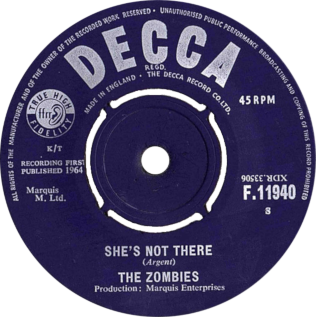
"She's Not There" is the debut single by the English rock band the Zombies, written by keyboardist Rod Argent. It reached No. 12 in the UK Singles Chart in September 1964, and No. 2 on the Billboard Hot 100 in the United States at the beginning of December 1964. In Canada, it reached No. 2.
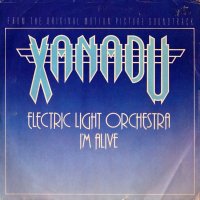
"I'm Alive" is a song by the Electric Light Orchestra (ELO), released as a single in May 1980. It is featured in a sequence near the beginning of the feature film Xanadu. The song also appears on the soundtrack album Xanadu.
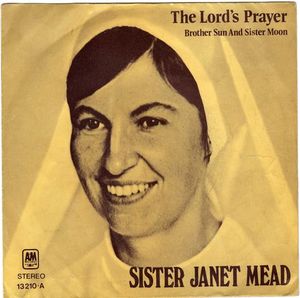
"The Lord's Prayer" is a pop rock setting of the Lord's Prayer with music by Arnold Strals recorded in 1973 by the Australian nun Sister Janet Mead. Mead was known for pioneering the use of contemporary rock music in celebrating the Roman Catholic Mass and for her weekly radio programs.

"Cecilia" is a song by American musical duo Simon & Garfunkel. It was released in April 1970 as the third single from the duo's fifth and final studio album, Bridge over Troubled Water (1970). Written by Paul Simon, the song's origins lie in a late-night party, in which the duo and friends began banging on a piano bench. They recorded the sound with a tape recorder, employing reverb and matching the rhythm created by the machine. Simon later wrote the song's guitar line and lyrics on the subject of an untrustworthy lover.
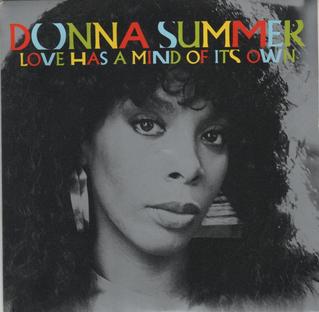
"Love Has a Mind of Its Own" is a song from She Works Hard for the Money, the 1983 album by Donna Summer. The song was written by Summer, Bruce Sudano and Michael Omartian, and produced by Omartian. It was issued as the third and final single in December 1983 by Mercury Records from the LP, all of which became chart hits in the US.

"Clean Up Woman" is a song by Betty Wright from her second studio album, I Love the Way You Love (1972). Written and produced by Clarence Reid and Willie Clarke, it was released in November 1971 in the U.S. as a 7" single with "I'll Love You Forever" on the B-side. The song's distinctive guitar lick was played by Willie "Little Beaver" Hale.

"Stay with Me" is a song by English rock band Faces, written jointly by lead singer Rod Stewart and guitarist Ronnie Wood. Released from the band's third studio album A Nod Is As Good As a Wink... to a Blind Horse (1971), it became their only major hit in the United States, although they had a further three Top 20 singles in the UK chart. The song has also appeared on various Faces compilations and on albums by both songwriters. The lyrics describe a woman named Rita, who has a face that she has "nothing to laugh about", and with whom the singer proposes a one-night stand, on the condition that she be gone when he wakes up.

"Part-Time Love" is a song written by English musician Elton John with lyrics by Gary Osborne. It is the sixth track off his 1978 album, A Single Man. It is also the opening track of side two. It proved to be one of the most popular singles the pair wrote, along with 1982's "Blue Eyes" and the 1980 US million seller "Little Jeannie". It was banned in the Soviet release of the album along with another song, "Big Dipper". The single reached No. 15 in the UK and peaked just outside the Top 20 in the US at No. 22.
"Barefootin'" is a 1966 song written and performed by Robert Parker. "Barefootin'" was arranged and produced by Wardell Quezergue in 1965. Parker's record label, Nola Records, claimed that the record sold over one million copies.
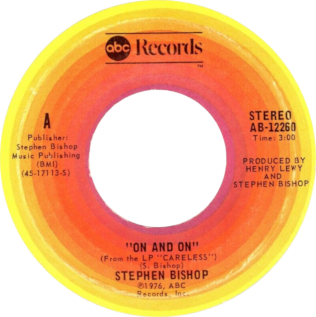
"On and On" is a song by American singer-songwriter Stephen Bishop. The song, from his debut album Careless, became a major hit, peaking at number 11 on the U.S. Billboard Hot 100 and spending 28 weeks on the chart. In Canada, the song peaked at number 6.

"Sweet Mary" is a song written by Steve Jablecki and performed by Wadsworth Mansion. "Sweet Mary" was featured on their 1971 album Wadsworth Mansion and was produced by Jim Calvert and Norman Marzano.
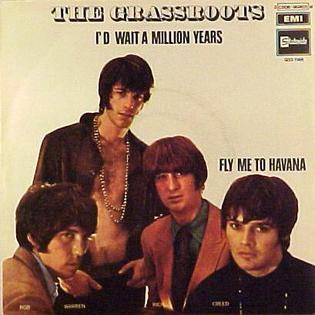
"(I'd) Wait a Million Years" is a 1969 hit single by The Grass Roots.

"Come On, Let's Go" is a song written and originally recorded by Ritchie Valens in 1958. It was the first of four charting singles from his self-titled debut album, and reached number 42 on the U.S. Billboard Hot 100 in May 1958.

Second Take is the sixth studio album by the English rock band The Searchers and the first with drummer Billy Adamson. Album consists of re-recordings of their earlier hits as well as their last US hit single "Desdemona" from the previous year. Guitarist and vocalist Mike Pender takes the lead as singer on all of the tracks. Second Take is also the band's first self-produced album.



















